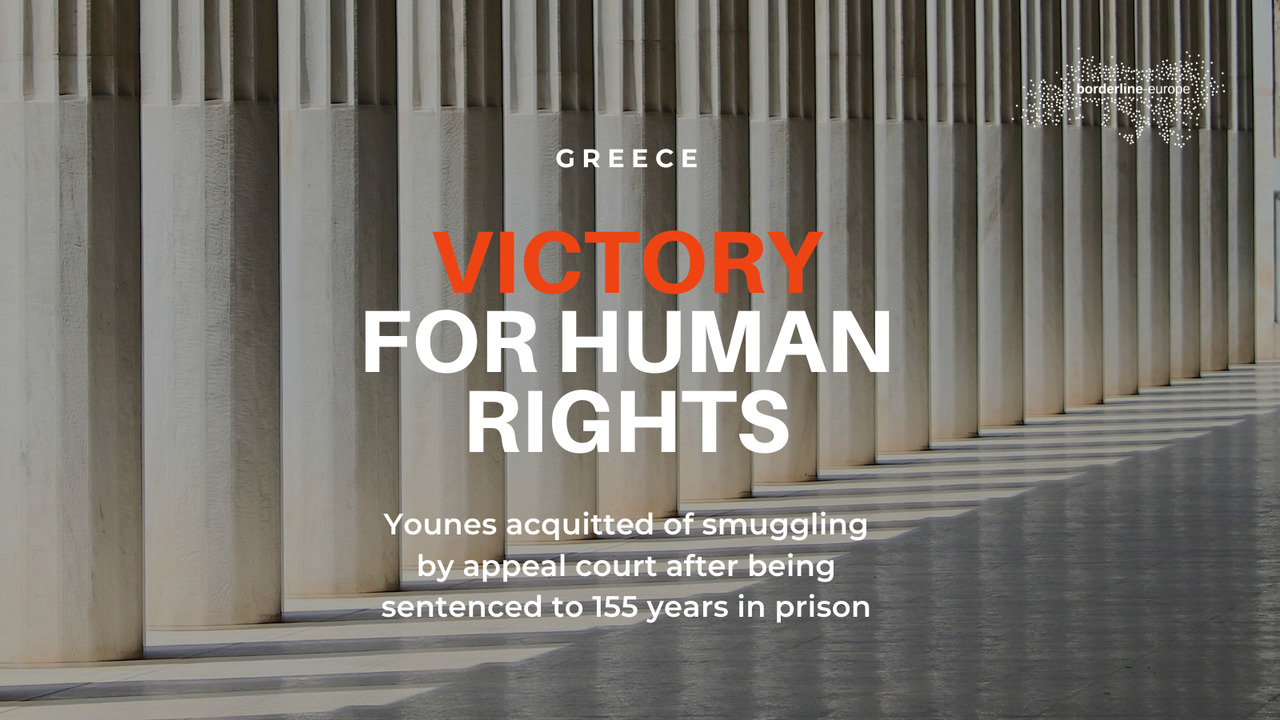Crete: Suspected boat-driver acquitted in appeal trial after being sentenced to 155 years imprisonment at first instance.
In September 2021, Younes tried to reach the EU by boat along with more than 150 other people. When they got into distress near Greek waters, Younes intervened and tried to save himself and the others from drowning. After being rescued and brought to Greece, he was accused of being part of the crew organizing the trip and charged with facilitating “unauthorized entry of others” (smuggling), “putting human life at risk” and “death”. After being sentenced to 155 years in prison, on 7 December 2023, his appeal trial took place in Crete, where he was acquitted.
What happened?
Younes, an afghan national, together with 152 people (23 women, 82 men, 48 minors), set off from Istanbul to the beaches of Smyrna, Turkey, where they were to take a boat to southern Italy. They were embarked on a blue wooden boat which was already not in a condition to cross the sea. The boat had been at sea for about three days, while the people were locked in the hold with no access to water or food. On the third day, about 90 miles west of Crete, the engine broke down, and the boat began to fill with water. For hours, the people tried everything they could to drain the water and to prevent the boat from sinking, until about 20 hours later, the tanker ship “Aristophanes” happened to pass close by.
According to the crew of the Aristophanes, the people on board tried to communicate their need for help by burning objects to create smoke, signaling with mirrors, raising their hands and shouting for help. The crew of the tanker Aristophanes requested permission from the Hellenic Centre for Research and Disposition to approach and carry out a rescue operation, which was granted.
On 24.09.2021, the boat was towed to the port of Paleochora, in Crete, where the port authority conducted a preliminary investigation into the incident. As a result, two Afghan nationals (including Younes) and a Kurdish national were identified as alleged "crew members", while a Turkish national was identified as the alleged "captain", all of whom were charged with "unauthorised entry of others" (smuggling), "endangering human life" and "death" (Article 30 of Law 4251/2014 paragraphs a,b,c).
The court of first instance acquitted one person, while Younes and the other two were each sentenced to 155 years in prison.
Last week, the appeal hearing took place in Crete. The criminal defence lawyer Spyridon Pantazis, who represented the acquitted person and Younes in the first trial, made the following statement:
“On 13 September 2022, we represented S.R., at the Court of Appeal in Chania, Crete, who was solemnly and unanimously acquitted after a year of unjust imprisonment. It was an important victory for human rights in Greece, as justice was done to an innocent man who had been wrongly accused and imprisoned. On 7 of December 2023, almost 15 months later from the first court, the appeal trial of Younes took place. The five judges of the Court of Appeal in Chania, ruled about the territorial incompetence of the Greek criminal courts in this particular case, as it took place 90 nautical miles west of Crete, while the Greek coastal zone is limited to 6 nautical miles from the Greek coast."
Context
Numerous people have already been convicted and imprisoned for years - regardless of the fact that they were simply trying to bring themselves and others to safety. As we have documented in various studies, the filing of such charges against migrants arriving on the Greek islands has been systematically used by the Greek state for several years. The arrests that follow these often-unfounded accusations of smuggling are arbitrary, and the trials flout basic standards of fairness. Without sufficient evidence, migrants are usually arrested upon arrival and kept in pre-trial detention for months. When their case finally comes to court, their trials last on average only 37 minutes, leading to sentences of 46 years and fines of over 332.209 Euro. Right now, more than 2.000 people are detained in Greek prisons for smuggling, forming the second-largest group of detainees in Greek prisons.


